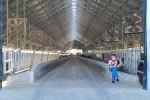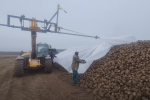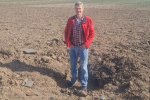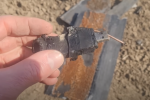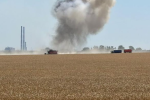
Interview
Kees Huizinga, From Wageningen to Ukraine: farming with vision
Kees Huizinga, a Wageningen-based agricultural technologist, built an agricultural empire in Ukraine. He is a proud farmer, father and fighter for European integration. War, ideals and innovation merge in his life's work.
Studies in agricultural technology
Kees was born and raised in Hellum, a small village in the Dutch province of Groningen. More than 20 years ago, he emigrated to Ukraine with his partner. He recounts his anything but boring career. It all began with his choice to study in Wageningen.
Kees: “After completing my pre-university education (VWO), it made sense for me to move on to the university. In 1993, I chose Wageningen, the only university where you could actually study something with ‘agriculture’. Of the three agricultural study programmes, I thought Tropical Agriculture would not suit me and Agricultural Economics was too theoretical, so I opted for Agricultural Technology. The combination of farming and engineering was perfect for me; I had been tinkering with mopeds, cross-country vehicles and old tractors from a young age. I have never regretted my choice. During my studies, I also took additional courses in economics and business because I felt, and still feel, that a university degree contributes to developing problem-solving skills. Wageningen gave me a broad perspective on what is possible, as well as insight into various aspects of barn design, machinery, software, logistics, and the operations of large companies. How much seed or fertiliser you need is something you ultimately only learn in practice anyway.
I studied for eight years in total, including a year on the board of the W.S.R. Argo student rowing association. For five years, I rowed at quite a high level; we trained seven to ten times a week. During that intense period, I acquired friends I still feel close to; I still see them regularly even after more than 30 years, and our contact always feels very warm and familiar. These are all people you can talk to in a 'Wageningen' way, that is, without too much fuss and other nonsense.
Via Russia and Poland to Ukraine
I ended up in Cherkasy in Ukraine more or less by chance. During my studies, I did an internship in Russia, and I later worked in Poland harvesting potatoes and beets. In early 2000, I went on an agricultural tour of Ukraine with a group of Dutch farmers. In 2002, I worked in Russia for Agrifac for another six months; for that company, I commissioned beet harvesters and handled warranty cases. Through the grapevine, I came into contact with my current business partners, who had just started a company in Ukraine. I joined them in their second year, first as a company director, and now also as a shareholder.
Kischenzi company in Ukraine
Located approximately 200 kilometres south of Kyiv, the company started out as an arable farm. Half of the land was still lying fallow with metre-high weeds on it. Back then, you could lease that land for little money; we paid 15 euros per hectare per year. Since then, the company has gradually grown; it may even have gotten a little out of control. We are gradually expanding to include pigs, cows and vegetables such as onions and carrots. This creates added value, extra jobs, extra taxes and therefore revenue for the state, allowing us to defend ourselves against Russian aggression.
A potential next step would be the processing of milk into cheese or other dairy products and possibly also processing or dehydrating of vegetables. Ideally, we would export these processed products, because 80% of the arable products produced by Ukraine are intended for export. That means adding value abroad, but that would be better done in Ukraine.
I love building a business that is good for employees, landlords, the environment and the state. Of course, it has to be financially sound, but there is far too much focus on shareholder value worldwide. There are also other values. What we have achieved together are moments that really count.
Farming in wartime
The war has brought, and continues to bring, a lot of tension. We had a cruise
missile fly over our farm, followed by a huge explosion of an ammunition depot
20 kilometres away. We are used to it by now, unfortunately. More than 40 of
our employees have already been drafted into the army; nine have since died and
three have gone missing. One is believed to be held in captivity. These things
touch you deeply, and they have a huge impact on everyone in our company.
Economically, the first two years of the war were difficult. The Russian
blockade prevented us from exporting grain through the Black Sea ports.
Alternative transport by road or train was far too expensive. Fortunately,
Ukraine has since disabled large parts of Russia's Black Sea fleet, so grain
export levels are now almost back to pre-war levels. This is essential – for us
as farmers, but also for stability in the global market.
Integration in Europe
Russia is deliberately trying to sow fear and instability in Europe. If things go wrong, we in Ukraine will be the first to feel it – but then Europe will follow. It is therefore crucial that Ukraine receives maximum support, especially now that support from the US is under pressure.
European criticism of Ukrainian agriculture sometimes stems from Russian propaganda. Troll factories deliberately spread disinformation through social media. What we often forget is this: Ukraine has increased its agricultural production more than fivefold in 20 years without agricultural subsidies (in 2003, this was about 20 million tonnes, and just before the war started, it had increased to more than 100 million tonnes). And as long as grain is exported through Black Sea ports, Europe is not affected. So agricultural subsidies will not be needed in future either.
I believe Ukraine can integrate into Europe just fine, with a clear vision and clear long-term policies. The country was taking steps towards becoming a normal civilised country, with young officials who really wanted to change things. Democracy does work here: there have been six to eight different presidents since independence. Unlike Russia or Belarus, where a dictator has been in power for more than 20 years. This kind of transition takes time, but we need to give Ukraine this time.
Family and De Leeuw Kyiv Foundation
In Wageningen, I met my wife Emmeke (WUR Tropical Land Use, 2004) at Argo and Ceres. We have two children who spent their primary school years in Ukraine and are now attending secondary school in the Netherlands. We often travel back and forth, although since the war, this has been a time-consuming activity; in fact, we now have to fly via Romania because no more planes fly from Ukraine due to the war. In the winter, I am more often in the Netherlands, in season more often in Ukraine. During holidays, the whole family comes along. For the children, Ukraine is also home. We do small projects there: constructing a tennis court out of concrete, making a horse stable out of an old barn, and creating an ice hockey rink on the lake (although with climate change, that is becoming increasingly more difficult).
In addition, Emmeke and I are engaged through our De Leeuw Kyiv Foundation. Together with four other Dutch people who have lived here for more than 20 years, we deliver humanitarian aid and support the army with generators, cars and medical supplies.
In Wageningen: things always work out
After all these years, I still feel like a proud Wageninger and I like to come back from time to time. I also still have a lot of contact with other Wageningen graduates and friends. Just the other day, I spoke to relatives whose children are now studying in Wageningen. The parents were a bit worried, as they should be. But I said what I always say: in Wageningen, things always work out.”
Additional information
- WUR Master study | Biosystems Engineering
- WUR background article | Bombs, mines and chemicals: how agricultural soils in Ukraine have been ravaged by war
- WUR newsarticle | After two years of war in Ukraine, the world's poor have less access to food
- Wageningen World article | Wheat is not scarce but expensive
Awards & socials
- Groningen man of the year 2022 (in Dutch)
- GFN Kleckner Global Farm Leader Award 2022 winner
- YouTube | Playlist 'The week of Kees Huizinga' (in Dutch)
- YouTube | Vlogs @Nieuwe Oogst (in Dutch)
- Instragram | DutchfarmerinUA
- We would like to thank the photographer of the header photo: Michiel Driebergen
